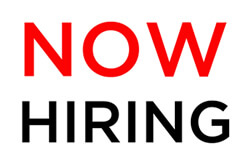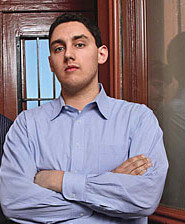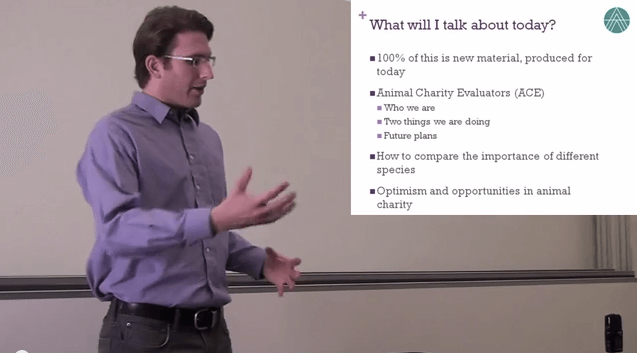This entry was originally posted on the AnimalCharityEvaluators.org blog. It is reposted here for reference only.
Animal Charity Evaluators is accepting applications for Fall interns!
We’re looking for passionate interns that care about reducing animal suffering effectively to help us with our research, development, operations, and communications between September and December. We have four telecommuting internships available for 10-20 hours each week, and we are accepting applications through the next two weeks.
If you think you have what it takes, then we strongly encourage you to apply. We’d love to see you on our future team!
We’re not the only ones hiring; check out jobboard.im for more available positions from effective altruism and effective animal advocacy organizations, including the Centre for Effective Altruism, GiveWell, the Machine Intelligence Research Institute, and Mercy For Animals.
An ethics-oriented weblog celebrating effective altruism, philosophy, and other beliefs Eric holds. Also: a place to post random thoughts.
11 August, 2014
16 June, 2014
Julio Koko Sosa
Yesterday, tío Julio "Koko" Sosa died. His passing came more quickly than I expected.
Julio was a master of the guitar. I was always mesmerized anytime he would play during one of our family get-togethers. The entire family will miss him greatly.
Julio performed, composed, and arranged for hundreds of recordings, concerts, and festivals over the years. He is well remembered in his hometown. Until very recently, he taught regularly in DC. Some of his students upload their covers of his songs on youtube. You can see him perform at the Kennedy Center below, or in El Salvador in the embedded video below that.
Julio was a master of the guitar. I was always mesmerized anytime he would play during one of our family get-togethers. The entire family will miss him greatly.
Julio performed, composed, and arranged for hundreds of recordings, concerts, and festivals over the years. He is well remembered in his hometown. Until very recently, he taught regularly in DC. Some of his students upload their covers of his songs on youtube. You can see him perform at the Kennedy Center below, or in El Salvador in the embedded video below that.
12 June, 2014
ACE Highlight: Donation Register
This entry was originally posted on the AnimalCharityEvaluators.org blog. It is reposted here for reference only.
When you donate to one of our recommended organizations, you can now register your donation with us. This will allow us to better measure our own effectiveness as a charity evaluator. All visitors who click to donate to one of our top charities will be taken to our donation register after they donate.
If you’ve given to one of our recommended charities recently, we encourage you to register your donation with ACE. Taking these few extra seconds can help us to understand how our supporters give over time.
This blog post is a part of our ACE Highlight series. Twice each month we feature current, relevant, and engaging topics from the ACE website.
This Week's ACE Highlight: Donation Register
As a charity evaluator, we are always on the lookout for new ways to measure our own effectiveness. That’s why we are debuting our donation register.When you donate to one of our recommended organizations, you can now register your donation with us. This will allow us to better measure our own effectiveness as a charity evaluator. All visitors who click to donate to one of our top charities will be taken to our donation register after they donate.
If you’ve given to one of our recommended charities recently, we encourage you to register your donation with ACE. Taking these few extra seconds can help us to understand how our supporters give over time.
03 June, 2014
Review: The Morals Game
 The Morals Game by Edward Stevens
The Morals Game by Edward StevensMy rating: 2 of 5 stars
Purportedly an objective introduction to different ethical theories, this book is actually one of the most biased introductory level texts on ethics that I've ever read.
Nothing the author wrote is wrong exactly, but he has a tendency to write each chapter from the point of view of different philosophers and ends up writing things like "X is true" when what he really means is "Y claims that X is true". This makes for somewhat confusing reading, and you end up with a book that says in chapter two that "utilitarianism is a moral theory for immature minds".
(A careful reader will note that some ten pages back or so he says that this is the view of a different philosopher, but I get the feeling that most readers will take him to be saying this in his own voice.)
At no point in this book is he sympathetic to the consequentialist point of view, even though he includes a chapter sympathetic to virtue ethics, which was only just then undergoing its 20th century revival in 1975. (In fact, his inclusion of virtue ethics in this introductory text is especially prescient, as the classic revival texts on virtue ethics were mostly published after 1975: see N.J.H. Dent's “Virtues and Actions” in The Philosophical Quarterly in 1975, Michael Stocker's “The Schizophrenia of Modern Ethical Theories” in the Journal of Philosophy in 1976, Peter Geach's The Virtues in 1977, Philippa Foot's Virtues and Vices in 1978, and John McDowell's “Virtue and Reason” in Monist in 1979.)
I cannot recommend this book to its intended audience. This is most definitely not a good intro to moral philosophy. It is written well enough to be easily understood (he even includes magazine-style quizzes), but it is horribly biased (or it at least appears to be biased) against consequentialist theories. If you want a good into to moral theories, read James Rachels and Stuart Rachels' The Elements of Moral Philosophy or Mark Timmons' Moral Theory: An Introduction.
Nor can I recommend this book to people already into ethics; the text does not go deeply into anything worthwhile, and nothing you do not already know will be covered. For intermediate readers, the book is a waste of time.
You may be wondering, then, why I bothered to read the whole thing and leave this review. In fact, I have a good excuse: my toddler cousin was baptised in a catholic church and the party was held in the church library. While the DJ played Beyoncé and my entire family drank wine at the bar, I searched the shelves for a book that wasn't about God or religion. Any book. After searching religiously (heh), I found only one book title that fit the bill: Edward Stevens' The Morals Game. And I have to say that although it was heavily biased against consequentialism (or was at least seemingly so), the author never presupposed God or religion within the book itself. I successfully found and read a book that didn't actively promote religion in this church when I badly needed the distraction, and so this book gets two stars instead of one.
View all my reviews
22 May, 2014
ACE Highlight: Twitter
This entry was originally posted on the AnimalCharityEvaluators.org blog. It is reposted here for reference only.
You can browse through a list of other effective altruism organizations, read through conversations we have with the public, or even check out photos and videos we’ve posted on social media.
ACE also has a presence on Facebook, G+, and LinkedIn. Are there any other social media platforms you’d like us to be on?
#EffectiveAltruism
This blog post is a part of our ACE Highlight series. Every other Thursday we feature current, relevant, and engaging topics from the ACE website.
This Week's ACE Highlight: Twitter
As animal charity evaluators, we always have a lot to say about what's best for helping animals. Sometimes, though, we like to keep it short.100 charities considered; only 2 recommended. Announcing our new top charities: @MercyForAnimals & @TheHumaneLeague. http://t.co/z6dlYAs27f
— ACE (@AnimalCharityEv) May 14, 2014Case in point: the @AnimalCharityEv Twitter account.
If you don’t already follow us on twitter, you should. We share stories and pictures of interest to anyone who cares about helping animals effectively. When it comes to news about effective altruism for animal advocacy, you can be sure that we’ll tweet it, retweet it, or otherwise talk about it on Twitter.You can browse through a list of other effective altruism organizations, read through conversations we have with the public, or even check out photos and videos we’ve posted on social media.
ACE also has a presence on Facebook, G+, and LinkedIn. Are there any other social media platforms you’d like us to be on?
#EffectiveAltruism
01 May, 2014
ACE Highlight: Conversations & Interviews
This entry was originally posted on the AnimalCharityEvaluators.org blog. It is reposted here for reference only.
That’s why we debuted our Conversations & Interviews page last March. Periodically, we conduct interviews and hold conversations with advocacy organization leaders, charity representatives, influential funders, academic researchers, and other experts. These interviews offer unique outside perspectives on our mission.
Our first interview was with Matt Ball, who co-founded and served as executive director of Vegan Outreach for over twenty years. His critique of research in animal advocacy and the motivations of animal activists generated discussion on our blog.
Our first conversation was with Elie Hassenfeld, co-founder and co-executive director of GiveWell. Elie spoke with ACE Board Chair Simon Knutsson on ACE’s vision, and helped us to better understand how we can accomplish our mission.
In addition, our Conversations & Interviews page links to fascinating discussions outside of ACE, such as GiveWell’s informal conversation on industrial agriculture with ACE Executive Director Jon Bockman, as well as ARZone’s podcast interview with Jon last month.
What kind of content would you like to see added to the Conversations & Interviews page? Do you have a potential interviewee in mind? You can be part of the discussion as well! Comment on our blog and visit our Facebook page.
This Week's ACE Highlight: Conversations & Interviews
This blog post is a part of our ACE Highlight series. Every other Thursday we feature current, relevant, and engaging topics from the ACE website.
ACE offers a wealth of content, including charity reviews, intervention research, and resources for charities, donors, and volunteers alike. Yet in order to learn as an organization and improve the advice we give, it’s important to sometimes get an outside view to supplement our data.That’s why we debuted our Conversations & Interviews page last March. Periodically, we conduct interviews and hold conversations with advocacy organization leaders, charity representatives, influential funders, academic researchers, and other experts. These interviews offer unique outside perspectives on our mission.
Our first interview was with Matt Ball, who co-founded and served as executive director of Vegan Outreach for over twenty years. His critique of research in animal advocacy and the motivations of animal activists generated discussion on our blog.
Our first conversation was with Elie Hassenfeld, co-founder and co-executive director of GiveWell. Elie spoke with ACE Board Chair Simon Knutsson on ACE’s vision, and helped us to better understand how we can accomplish our mission.
In addition, our Conversations & Interviews page links to fascinating discussions outside of ACE, such as GiveWell’s informal conversation on industrial agriculture with ACE Executive Director Jon Bockman, as well as ARZone’s podcast interview with Jon last month.
What kind of content would you like to see added to the Conversations & Interviews page? Do you have a potential interviewee in mind? You can be part of the discussion as well! Comment on our blog and visit our Facebook page.
17 April, 2014
ACE Highlight: Media
This entry was originally posted on the AnimalCharityEvaluators.org blog. It is reposted here for reference only.
For this ACE Highlight, we’re showcasing our Media page. This is the press center of our site, and it contains everything that a writer needs when composing a story about ACE.
On our media page, you’ll find links to several pages on our site, ranging from our history to our planned research. It serves as a warehouse for ACE’s informational highlights. The media center is also the home of our videos, a list of conference appearances, and quotes from what others are saying.
While most visitors to our site just want to see our core recommendations, research, or blog, our media center is perfect for reporters who don’t have a lot of time to read through everything we publish. Check out our media center for an easy snapshot of our work.
This Week's ACE Highlight: Media
This blog post is a part of our ACE Highlight series which draws attention to timely and relevant pages on our site. Look for it on the first and third Thursday of every month.
Like all organizations, publishing our findings is an important component of advancing our mission. Our work will be lost amidst a torrent of information from other sources on the web if we don’t find a way to get noticed by the press and the public.For this ACE Highlight, we’re showcasing our Media page. This is the press center of our site, and it contains everything that a writer needs when composing a story about ACE.
On our media page, you’ll find links to several pages on our site, ranging from our history to our planned research. It serves as a warehouse for ACE’s informational highlights. The media center is also the home of our videos, a list of conference appearances, and quotes from what others are saying.
While most visitors to our site just want to see our core recommendations, research, or blog, our media center is perfect for reporters who don’t have a lot of time to read through everything we publish. Check out our media center for an easy snapshot of our work.
08 April, 2014
ACE Interviews: Matt Ball
This entry was originally posted on the AnimalCharityEvaluators.org blog. It is reposted here for reference only.
You can read the full interview on the Conversations and Interviews section of our site.
ACE Interviews: Matt Ball
This blog post is a part of our ACE Interviews series where ACE conducts interviews with activist leaders, charity representatives, influential funders, academic researchers, and other experts. Our interviews touch on several aspects of animal advocacy and serve as an outside view that helps showcase issues that we might otherwise miss on our own.
We’re kicking off our ACE Interview series with an interview of Matt Ball, who co-founded and served as executive director of Vegan Outreach for over twenty years. Our interview with Matt covers several topics related to utilitarianism, leafleting, research, and popularity. Here are a few highlights from the interview:
5. What role do you think research will play in the future of animal advocacy?
I obviously hate to say it, but I think research will not play as significant a role in the future of animal advocacy as it could or should. This is not just because of the difficulty of getting honest, statistically-significant, meaningful, long-term, prescriptive data. Rather, it is because there are relatively few individuals who are truly motivated by maximum impact.
You will always be able to raise orders of magnitude more money for dogs and cats than for unseen billions of factory-farmed birds. You will always be able to raise more far money from tragedies and high-profile cases of cruelty than for grassroots education. You will always be able to get more people interested in short-term campaigns than leafleting and teaching. You will always excite far more vegans by praising veganism rather than discussing effective first-step advocacy to new people.
This is just human nature. And we hurt animals when we ignore human nature.
Research results – regardless of if they are honest, relevant, scalable, significant, and universal – may shuffle the relatively few dollars from a handful of strict utilitarians, but they won’t change human nature. If we want to do our absolute best for the animals, we have to work with people where they are – members and the public alike – rather from where we want them to be.
11. If you were to start over in your advocacy career, what are two or three things that you would do differently?
I wrote two books (The Animal Activist's Handbook and The Accidental Activist) and only covered some of this!
1. Be very careful with what you believe and choose to present to the public. There aren't many honest sources of information, and, as humans, we're quick to believe what we want to believe, and dismiss anything else.
It would have been hard for me to learn this 25 years ago, because I was the epitome of this problem. I was singularly concerned with defending myself / my veganism, rather than actually pursuing effective advocacy to help animals. I believed, and parroted, everything and anything that seemed remotely pro-veg or anti-meat.
Unfortunately, this continues today, with many vegans focused on what makes them feel justified and/or popular with other vegans. For example, Ginny Messina, RD, checks studies promoted by various animal advocacy groups. When she actually reads the anti-red-meat papers (this one, for example), some of these studies also say eating chicken is health-neutral or even beneficial! Think about that – animal advocates promoting studies that show eating chickens is beneficial, just because the study showed negative consequences for red meat.
2. Realize we are going to win. It won't come about from some vegans demanding others go vegan. Rather, we will create the new world we desire through continued constructive and realistic outreach that helps more people take the first steps to help animals. And then the next steps. And to maintain those changes.
Change is occurring and will continue to occur through outreach that is psychologically sound, based in the real world, and integrated into our capitalist society. And then we build methodically on every step and change the world piece by piece.
06 March, 2014
ACE Highlight: Donation Policy
This entry was originally posted on the AnimalCharityEvaluators.org blog. It is reposted here for reference only.
This policy not only helps us to avoid a conflict of interest, but also helps us to avoid the appearance of a conflict of interest. We want to ensure that our evaluation process never has the perception of influence from outside organizations that we might plausibly recommend.
You can read more about our donation policy on our website.
Our goal is to move many times our annual budget to our recommended charities, and this policy will help to make our recommendations strong enough to achieve this. If you’d like to donate toward our work, you can support us by giving online. We are very grateful to all those who help to support Animal Charity Evaluators.
This Week's ACE Highlight: Donation Policy
This blog post is a part of our ACE Highlight series which draws attention to timely and relevant pages on our site. Look for it on the first and third Thursday of every month.
Like all nonprofit organizations, we need donations to survive. However, it is important that we separate our donation sources from our policy decisions. To this end, we enforce a donation conflict of interest policy that restricts which donations we may accept from potential donors.This policy not only helps us to avoid a conflict of interest, but also helps us to avoid the appearance of a conflict of interest. We want to ensure that our evaluation process never has the perception of influence from outside organizations that we might plausibly recommend.
You can read more about our donation policy on our website.
Our goal is to move many times our annual budget to our recommended charities, and this policy will help to make our recommendations strong enough to achieve this. If you’d like to donate toward our work, you can support us by giving online. We are very grateful to all those who help to support Animal Charity Evaluators.
22 February, 2014
Jobs and Internships Available
This entry was originally posted on the AnimalCharityEvaluators.org blog. It is reposted here for reference only.
 We're looking for talented people to help us to find and promote the best ways to help animals. We have a wide variety of internship opportunities available, including openings with research, operations, development, and even our communications team. If you think you have what it takes, then apply to join us for three months (with a possibility of extension). You can make a real difference in bringing the effective altruist mindset to the world of animal advocacy.
We're looking for talented people to help us to find and promote the best ways to help animals. We have a wide variety of internship opportunities available, including openings with research, operations, development, and even our communications team. If you think you have what it takes, then apply to join us for three months (with a possibility of extension). You can make a real difference in bringing the effective altruist mindset to the world of animal advocacy.
Interested in an internship at ACE? Now's the time to apply!
 We're looking for talented people to help us to find and promote the best ways to help animals. We have a wide variety of internship opportunities available, including openings with research, operations, development, and even our communications team. If you think you have what it takes, then apply to join us for three months (with a possibility of extension). You can make a real difference in bringing the effective altruist mindset to the world of animal advocacy.
We're looking for talented people to help us to find and promote the best ways to help animals. We have a wide variety of internship opportunities available, including openings with research, operations, development, and even our communications team. If you think you have what it takes, then apply to join us for three months (with a possibility of extension). You can make a real difference in bringing the effective altruist mindset to the world of animal advocacy.
Plus, if you're looking for additional opportunities, the Centre for Effective Altruism is also hiring! Their open positions include a Director of Development, a Careers Analyst, interns for their Graduate Volunteer Scheme, and many more. CEA is home to Giving What We Can and 80,000 Hours, two great organizations working in effective altruism. To find out more about CEA's employment opportunities, apply on their site by February 28, 2014.
If you know of anyone who is looking to make a serious difference as part of the effective altruism movement, please send them a link to this blog entry. Whether they apply for a position with ACE or one with CEA, you could help to make a huge difference in their lives.
Subscribe to:
Posts (Atom)






